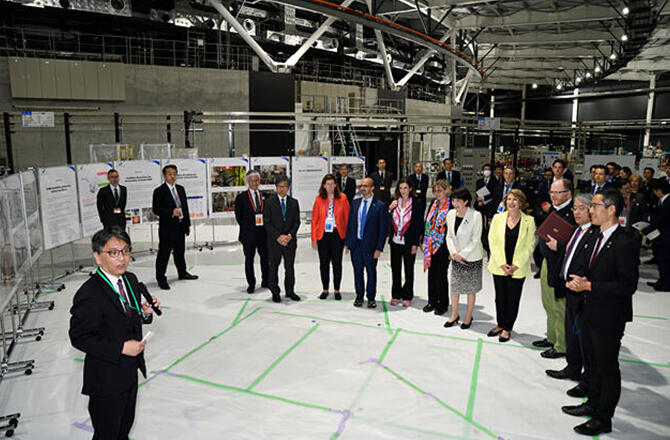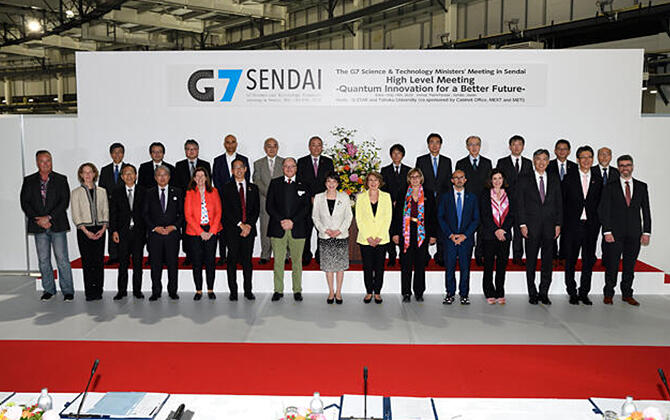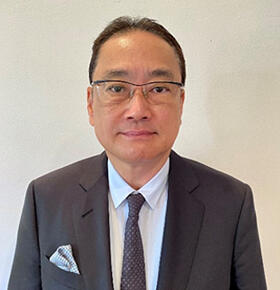The third major agenda item for the G7 Science and Technology Ministers' Meeting in Sendai was "International Cooperation in Science and Technology to Solve Global Issues."
While reaffirming the crucial role of international science and technology cooperation in finding innovative solutions to global challenges, the Ministers addressed individual themes such as space, climate change, the ocean, and polar research, as well as global utilization of research infrastructures and the promotion of international talent mobility and circulation.
Space: Addressing the orbital debris problem
In terms of space, space debris in Earth's orbit was mostly discussed as an urgent issue. As Takaichi, who chaired the meeting, is also the Minister of State for Space Policy, space was one of the themes that Japan particularly focused on as the G7 chair this time. This was the first time that space was directly discussed about at the G7 Science and Technology Ministers' Meeting.

More specifically, mitigation of orbital debris is urgently needed through the implementation of the international guidelines adopted at the United Nations Committee on the Peaceful Uses of Outer Space (UN COPUOS), the development of orbit debris remediation technologies and international cooperation on such development. Japanese venture companies are working to develop orbit debris remediation technologies, and Japan places great emphasis on this topic. In their Communiqué, the Ministers stated, "(We) reiterate our respective commitments, already made by G7 members, not to conduct destructive direct-ascent anti-satellite missile tests and encourage others to follow suit." The underlying message here is to encourage countries outside of the G7 (which would naturally be limited to those having the ability to conduct such space activities) to exercise self-restraint.
The Ocean: International cooperation in the context of the fight against climate change
The ocean is another theme to which Japan has attached great importance over the years. On the basis of the discussions at the G7 Science and Technology Ministers' Meeting in Tsukuba, Ibaraki, in 2016, "the G7 Future of the Seas and Oceans Initiative (FSOI) Working Group (WG)" was established, and ever since, discussions and work have been led by the FSOI National Focal Points in each of the G7 countries and the FSOI Coordination Centre hosted by the U.K. and the EU. The FSOI/WG meeting held in November 2022 decided to adopt co-chairmanship by the current G7 Presidency and the incoming Presidency. As with the reports of the other WGs, that of the FSOI/WG activities was attached to the Ministers' Communiqué in the Annex.
In the Communiqué, the Members committed to implementing and improving comprehensive ocean observations conducted by survey vessels, Argo floats, moorings, satellites, and other ocean observation platforms. They also recognized the need to improve both observations and modeling by steadily developing the Digital Twins of the Ocean so that actionable value-added monitoring and forecast information can be shared.
A related theme is the issues in the Arctic and Antarctic polar regions. As the polar regions are huge data-gap areas, together with the deep oceans, and as polar research plays an increasingly vital role in addressing the urgent climate issue, international cooperation for its observation and research needs to be strengthened. The Ministerial Communiqué affirms the importance of Polar research and the support for international cooperation through the utilization of international observation platforms such as Arctic and Antarctic research vessels.
The Arctic Science Ministerial (ASM) is a framework for international scientific and technological cooperation in the Arctic that involves about 30 countries. Japan has been actively responding to this theme by co-hosting the third ASM meeting in Tokyo, with Iceland, in 2021, implementing the Arctic Challenge for Sustainability II (ArCSII) project and building an Arctic research vessel. Against this backdrop, polar research and international cooperation for such research seem to have been taken up as concrete themes for the first time in the framework of the G7 Science and Technology Ministers' Meeting, which Japan chaired.
Promotion of global utilization of research infrastructures and its output
With regard to the promotion of the global utilization of research infrastructure and their output, the Ministers' Meeting recognized that interconnecting physical and digital functions can bring about impactful innovation to the economy as well as novel research and development methodologies.
International cooperation on research infrastructure was one of the main themes of the 2008 Okinawa Meeting, the first G7 Science and Technology Ministers' Meeting. There have since been ongoing discussions by the Group of Senior Officials (GSO) on this topic. The GSO is unique in that the European Commission (EC) serves as the secretariat and non-G7 countries (Australia, Brazil, China, India, Mexico, Russia, and South Africa) also participate in it. The last in-person meeting of the GSO was the 2019 Shanghai meeting, after which the COVID-19 pandemic forced GSO meetings to go online; the online work was also interrupted, however, by Russia's invasion of Ukraine. Following a decision to suspend cooperation with Russia, the GSO's work resumed last fall. The High Energy Accelerator Research Organization (KEK) in Japan is expected to be the venue for the next GSO face-to-face meeting this year.
On May 14, the Ministers attending the Sendai Meeting visited one of the latest examples of large-scale advanced research infrastructure, NanoTerasu, a next-generation synchrotron radiation facility, described as a "giant microscope", which is currently under construction.

(provided by the Cabinet Office)
Promotion of international talent mobility and circulation
With regard to the promotion of international talent mobility and circulation, the Communiqué of the Sendai Meeting stated, "Connectivity among G7 and aligned countries should be enhanced, for instance, by bolstering collaboration among world-class researchers to strengthen a global-scale innovation ecosystem.", "The G7 encourages international talent mobility and circulation, especially of early career researchers to engage in international cooperation and collaborative research with other partners sharing their values.", "We will work together to identify and minimize barriers to international research collaboration and mobility."
As excellent research results and innovation are more likely to be promoted in an environment in which diverse talents interact, collaborate, and compete, strengthening the international circulation of talent is considered an essential element for a vibrant research and development. For Japan, which is striving to regain its international competitiveness, it is increasingly important to internationalize the research environment, promote international talent mobility, and integrate Japan into the international circulation of talent. The program "Adopting Sustainable Partnerships for Innovative Research Ecosystem (ASPIRE)," a government-funded program of JST and the Japan Agency for Medical Research and Development (AMED) to support the participation of Japanese researchers in the world's top researchers' circle, will soon fully implemented. This program is just one example of Japan's initiatives in response to the G7's recognition of the importance of international research collaboration and mobility.
G7 Side Events, G-Science Academy, and other items
In addition to the aforementioned visit to NanoTerasu, after the main meeting, the G7 Ministers attended several side events. On May 13, they visited the remains of Arahama Elementary School, designated as Ruins of the Great East Japan Earthquake, and the International Research Institute of Disaster Science (IRIDeS) of Tohoku University1. On May 14, they participated in the High-Level Meeting "Quantum Innovation for a Better Future."

(provided by the Cabinet Office)
This meeting on quantum technology was hosted by Tohoku University and the Quantum STrategic Industry Alliance for Revolution (Q-STAR, established in May 2022), where industry, government, and academia, including overseas industrial organizations, gathered to engage in an active exchange of ideas on how to accelerate the global-scale implementation of quantum technologies, which are attracting growing interest worldwide.
The G Science Academy is a science related G7 engagement group. Representatives from the national academies of the G7 countries and others discuss essential global issues and make recommendations. The Science Council of Japan (SCJ) participates from Japan. This year's meeting, hosted by SCJ, was held on March 7, and three joint statements were produced: "Addressing Systemic Risks in a Changing Climate: Science and Technology in Support of Cross-Sectoral Decision Making," "Delivering Better Health and Well-Being of Older People through Wisdom Sharing and Innovation," and "Restoration and Recovery of the Ocean and its Biodiversity."2
These inputs by The G Science Academy are reported directly to the G7 leaders, rather than through the G7 Science and Technology Ministerial Process. The Joint Statements of the G Science Academy was presented to Prime Minister Kishida, who chaired the G7 Hiroshima Summit3.
Italy, which is taking over the G7 presidency from Japan, has announced its intention of hosting a meeting of G7 Science and Technology Ministers next year. The meeting will be the second one hosted by Italy, following the G7 Turin Science Ministers' Meeting in 2017.
The G20 Research Ministers' Meeting is also scheduled for this July, being hosted by India, the chairing country of the G20. Increasingly active discussions in major international frameworks such as the G7 and G20 indicate that science, technology and innovation are being mainstreamed and established as major themes for international cooperation.

Profile
Yoshihiro Higuchi
Director for Global Strategic Issues, Japan Science and Technology Agency (JST)
His public service career began at the Ministry of Foreign Affairs (MOFA) in 1987. After studying at the National School of Administration (ENA) in France, he experienced different posts at MOFA relating to the OECD, UN, APEC, Oceania and EU, among others. Served as Director of the First African Division of MOFA and as Director of the Trade Licensing Division of the Ministry of Economy, Trade and Industry (METI). Outside Japan, he has worked for the Permanent Delegation to the OECD (Paris), Embassy in Egypt, UNESCO Secretariat (Paris), Embassies in Cambodia and France (as Minister and Deputy Chief of Mission). Served as Ambassador Extraordinary and Plenipotentiary of Japan to Madagascar and the Union of Comoros from January 2020 until he took up his current position in October 2022.
- 1Tohoku University:
https://www.tohoku.ac.jp/en/news/university_news/g7_science_and_technology_ministers_meet_in_sendai.html - 2Science Council of Japan:
https://www.scj.go.jp/en/int/g-science.html - 3Website of the Prime Minister's Office:
https://japan.kantei.go.jp/101_kishida/actions/202303/_00007.html
Produced by the Science Japan Editorial Team




